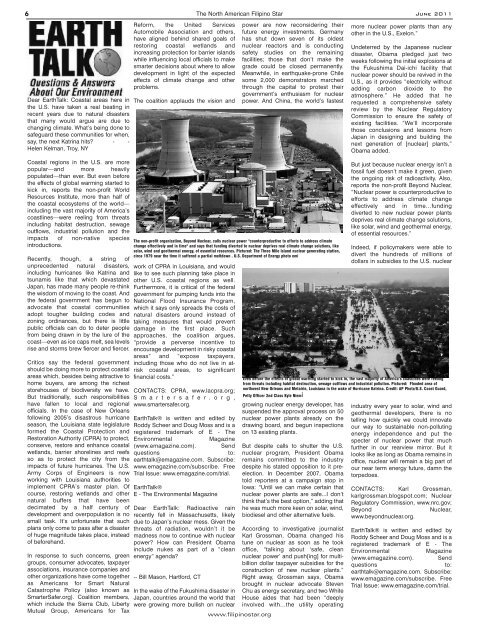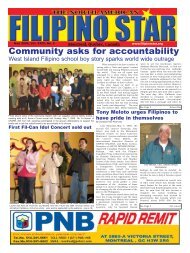Filipino Star - June 2011 Issue
Filipino Star - June 2011 Issue
Filipino Star - June 2011 Issue
Create successful ePaper yourself
Turn your PDF publications into a flip-book with our unique Google optimized e-Paper software.
6<br />
Dear EarthTalk: Coastal areas here in<br />
the U.S. have taken a real beating in<br />
recent years due to natural disasters<br />
that many would argue are due to<br />
changing climate. What’s being done to<br />
safeguard these communities for when,<br />
say, the next Katrina hits? - -<br />
Helen Kelman, Troy, NY<br />
Coastal regions in the U.S. are more<br />
popular—and more heavily<br />
populated—than ever. But even before<br />
the effects of global warming started to<br />
kick in, reports the non-profit World<br />
Resources Institute, more than half of<br />
the coastal ecosystems of the world—<br />
including the vast majority of America’s<br />
coastlines—were reeling from threats<br />
including habitat destruction, sewage<br />
outflows, industrial pollution and the<br />
impacts of non-native species<br />
introductions.<br />
Recently, though, a string of<br />
unprecedented natural disasters,<br />
including hurricanes like Katrina and<br />
tsunamis like that which devastated<br />
Japan, has made many people re-think<br />
the wisdom of moving to the coast. And<br />
the federal government has begun to<br />
advocate that coastal communities<br />
adopt tougher building codes and<br />
zoning ordinances, but there is little<br />
public officials can do to deter people<br />
from being drawn in by the lure of the<br />
coast—even as ice caps melt, sea levels<br />
rise and storms brew fiercer and fiercer.<br />
Critics say the federal government<br />
should be doing more to protect coastal<br />
areas which, besides being attractive to<br />
home buyers, are among the richest<br />
storehouses of biodiversity we have.<br />
But traditionally, such responsibilities<br />
have fallen to local and regional<br />
officials. In the case of New Orleans<br />
following 2005’s disastrous hurricane<br />
season, the Louisiana state legislature<br />
formed the Coastal Protection and<br />
Restoration Authority (CPRA) to protect,<br />
conserve, restore and enhance coastal<br />
wetlands, barrier shorelines and reefs<br />
so as to protect the city from the<br />
impacts of future hurricanes. The U.S.<br />
Army Corps of Engineers is now<br />
working with Louisiana authorities to<br />
implement CPRA’s master plan. Of<br />
course, restoring wetlands and other<br />
natural buffers that have been<br />
decimated by a half century of<br />
development and overpopulation is no<br />
small task. It’s unfortunate that such<br />
plans only come to pass after a disaster<br />
of huge magnitude takes place, instead<br />
of beforehand.<br />
In response to such concerns, green<br />
groups, consumer advocates, taxpayer<br />
associations, insurance companies and<br />
other organizations have come together<br />
as Americans for Smart Natural<br />
Catastrophe Policy (also known as<br />
SmarterSafer.org). Coalition members,<br />
which include the Sierra Club, Liberty<br />
Mutual Group, Americans for Tax<br />
Reform, the United Services<br />
Automobile Association and others,<br />
have aligned behind shared goals of<br />
restoring coastal wetlands and<br />
increasing protection for barrier islands<br />
while influencing local officials to make<br />
smarter decisions about where to allow<br />
development in light of the expected<br />
effects of climate change and other<br />
problems.<br />
The coalition applauds the vision and<br />
work of CPRA in Louisiana, and would<br />
like to see such planning take place in<br />
other U.S. coastal regions as well.<br />
Furthermore, it is critical of the federal<br />
government for pumping funds into the<br />
National Flood Insurance Program,<br />
which it says only spreads the costs of<br />
natural disasters around instead of<br />
taking measures that would prevent<br />
damage in the first place. Such<br />
approaches, the coalition argues,<br />
“provide a perverse incentive to<br />
encourage development in risky coastal<br />
areas” and “expose taxpayers,<br />
including those who do not live in atrisk<br />
coastal areas, to significant<br />
financial costs.”<br />
CONTACTS: CPRA, www.lacpra.org;<br />
S m a r t e r s a f e r . o r g ,<br />
www.smartersafer.org.<br />
EarthTalk® is written and edited by<br />
Roddy Scheer and Doug Moss and is a<br />
registered trademark of E - The<br />
Environmental Magazine<br />
(www.emagazine.com). Send<br />
questions to:<br />
earthtalk@emagazine.com. Subscribe:<br />
www.emagazine.com/subscribe. Free<br />
Trial <strong>Issue</strong>: www.emagazine.com/trial.<br />
EarthTalk®<br />
E - The Environmental Magazine<br />
Dear EarthTalk: Radioactive rain<br />
recently fell in Massachusetts, likely<br />
due to Japan’s nuclear mess. Given the<br />
threats of radiation, wouldn’t it be<br />
madness now to continue with nuclear<br />
power? How can President Obama<br />
include nukes as part of a “clean<br />
energy” agenda?<br />
-- Bill Mason, Hartford, CT<br />
In the wake of the Fukushima disaster in<br />
Japan, countries around the world that<br />
were growing more bullish on nuclear<br />
The North American <strong>Filipino</strong> <strong>Star</strong><br />
www.filipinostar.org<br />
power are now reconsidering their<br />
future energy investments. Germany<br />
has shut down seven of its oldest<br />
nuclear reactors and is conducting<br />
safety studies on the remaining<br />
facilities; those that don’t make the<br />
grade could be closed permanently.<br />
Meanwhile, in earthquake-prone Chile<br />
some 2,000 demonstrators marched<br />
through the capital to protest their<br />
government’s enthusiasm for nuclear<br />
power. And China, the world’s fastest<br />
The non-profit organization, Beyond Nuclear, calls nuclear power "counterproductive to efforts to address climate<br />
change effectively and in time" and says that funding diverted to nuclear deprives real climate change solutions, like<br />
solar, wind and geothermal energy, of essential resources. Pictured: The Three Mile Island nuclear generating station,<br />
circa 1979 near the time it suffered a partial meltdown . U.S. Department of Energy photo emi<br />
growing nuclear energy developer, has<br />
suspended the approval process on 50<br />
nuclear power plants already on the<br />
drawing board, and begun inspections<br />
on 13 existing plants.<br />
But despite calls to shutter the U.S.<br />
nuclear program, President Obama<br />
remains committed to the industry<br />
despite his stated opposition to it preelection.<br />
In December 2007, Obama<br />
told reporters at a campaign stop in<br />
Iowa: “Until we can make certain that<br />
nuclear power plants are safe...I don’t<br />
think that’s the best option,” adding that<br />
he was much more keen on solar, wind,<br />
biodiesel and other alternative fuels.<br />
According to investigative journalist<br />
Karl Grossman, Obama changed his<br />
tune on nuclear as soon as he took<br />
office, “talking about ‘safe, clean<br />
nuclear power’ and push[ing] for multibillion<br />
dollar taxpayer subsidies for the<br />
construction of new nuclear plants.”<br />
Right away, Grossman says, Obama<br />
brought in nuclear advocate Steven<br />
Chu as energy secretary, and two White<br />
House aides that had been “deeply<br />
involved with…the utility operating<br />
<strong>June</strong> <strong>2011</strong><br />
more nuclear power plants than any<br />
other in the U.S., Exelon.”<br />
Undeterred by the Japanese nuclear<br />
disaster, Obama pledged just two<br />
weeks following the initial explosions at<br />
the Fukushima Dai-ichi facility that<br />
nuclear power should be revived in the<br />
U.S., as it provides “electricity without<br />
adding carbon dioxide to the<br />
atmosphere.” He added that he<br />
requested a comprehensive safety<br />
review by the Nuclear Regulatory<br />
Commission to ensure the safety of<br />
existing facilities. “We’ll incorporate<br />
those conclusions and lessons from<br />
Japan in designing and building the<br />
next generation of [nuclear] plants,”<br />
Obama added.<br />
But just because nuclear energy isn’t a<br />
fossil fuel doesn’t make it green, given<br />
the ongoing risk of radioactivity. Also,<br />
reports the non-profit Beyond Nuclear,<br />
“Nuclear power is counterproductive to<br />
efforts to address climate change<br />
effectively and in time…funding<br />
diverted to new nuclear power plants<br />
deprives real climate change solutions,<br />
like solar, wind and geothermal energy,<br />
of essential resources.”<br />
Indeed, if policymakers were able to<br />
divert the hundreds of millions of<br />
dollars in subsidies to the U.S. nuclear<br />
Even before the effects of global warming started to kick in, the vast majority of America’s coastlines were reeling<br />
from threats including habitat destruction, sewage outflows and industrial pollution. Pictured: Flooded area of<br />
northwest New Orleans and Metairie, Louisiana in the wake of Hurricane Katrina. Credit: AP Photo/U.S. Coast Guard,<br />
Petty Officer 2nd Class Kyle Niemi<br />
industry every year to solar, wind and<br />
geothermal developers, there is no<br />
telling how quickly we could innovate<br />
our way to sustainable non-polluting<br />
energy independence and put the<br />
specter of nuclear power that much<br />
further in our rearview mirror. But it<br />
looks like as long as Obama remains in<br />
office, nuclear will remain a big part of<br />
our near term energy future, damn the<br />
torpedoes.<br />
CONTACTS: Karl Grossman,<br />
karlgrossman.blogspot.com; Nuclear<br />
Regulatory Commission, www.nrc.gov;<br />
Beyond Nuclear,<br />
www.beyondnuclear.org.<br />
EarthTalk® is written and edited by<br />
Roddy Scheer and Doug Moss and is a<br />
registered trademark of E - The<br />
Environmental Magazine<br />
(www.emagazine.com). Send<br />
questions to:<br />
earthtalk@emagazine.com. Subscribe:<br />
www.emagazine.com/subscribe. Free<br />
Trial <strong>Issue</strong>: www.emagazine.com/trial.















